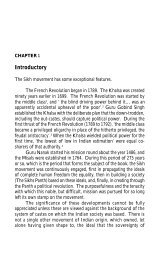Fundamentalism and the Sikh Religious Tradition by T.N. Madan
Fundamentalism and the Sikh Religious Tradition by T.N. Madan
Fundamentalism and the Sikh Religious Tradition by T.N. Madan
Create successful ePaper yourself
Turn your PDF publications into a flip-book with our unique Google optimized e-Paper software.
The <strong>Sikh</strong>s are known for <strong>the</strong>ir love <strong>and</strong> struggle for freedom. This new policy,<br />
<strong>the</strong> <strong>Sikh</strong>s feel, is aptly described <strong>by</strong> Machiavelli's observations, "Those states which have<br />
been acquired or accustomed to live at liberty under <strong>the</strong>ir own laws, <strong>the</strong>re are three ways<br />
of holding <strong>the</strong>m. The first is to despoil <strong>the</strong>m; <strong>the</strong> second is to go <strong>and</strong> live <strong>the</strong>re in person;<br />
<strong>the</strong> third is to allow <strong>the</strong>m to live under <strong>the</strong>ir own laws, taking tribute of <strong>the</strong>m, <strong>and</strong><br />
creating within <strong>the</strong> country a government composed of a few who will keep it friendly to<br />
you. Because this government, being created <strong>by</strong> <strong>the</strong> Prince, knows<br />
that it cannot exist without his friendship <strong>and</strong> protection, will do all it can to keep <strong>the</strong>m."<br />
Hence forward it would seem that <strong>the</strong> Central Government has been following<br />
<strong>the</strong> three<br />
pronged policy of despoiling Punjab, ruling it <strong>by</strong> stooge governments, <strong>and</strong> imposing <strong>the</strong><br />
President's rule if <strong>and</strong> when, <strong>by</strong> <strong>the</strong> democratic process, a non-Congress government<br />
came into power in <strong>the</strong> state. The subsequent history of <strong>the</strong> Punjab has been just a<br />
struggle between <strong>the</strong> <strong>Sikh</strong>s, historically known for <strong>the</strong>ir love of liberty, <strong>and</strong> <strong>the</strong> Centre<br />
pursuing <strong>the</strong> above policy. Both Mrs. Indira G<strong>and</strong>hi <strong>and</strong> Shri N<strong>and</strong>a were concerned <strong>and</strong><br />
worried about <strong>the</strong> proposal for a Punjabi Suba having been accepted <strong>by</strong> <strong>the</strong> Congress.<br />
While actually reorganising <strong>the</strong> old state, <strong>the</strong> Home Minister passed an Act<br />
which virtually scuttled <strong>the</strong> very idea of a Punjabi speaking state as recommended <strong>by</strong> <strong>the</strong><br />
Congress. It made <strong>the</strong> Constitutional situation worse for <strong>the</strong> <strong>Sikh</strong>s." The Punjabi speaking<br />
areas <strong>and</strong> Hindi speaking areas in <strong>the</strong> old Punjab, had stood clearly demarcated <strong>and</strong><br />
accepted <strong>by</strong> all parties <strong>and</strong> public men under <strong>the</strong> official formulae called <strong>the</strong> Sachar<br />
Formula of 1949, <strong>and</strong> <strong>the</strong> Regional Parliamentary Formula. But, <strong>the</strong>se accepted<br />
demarcations were unilaterally annulled <strong>and</strong> a Commission for making a new<br />
demarcation was appointed, giving it <strong>the</strong> direction to follow <strong>the</strong> 1961 Census, which had<br />
been virtually rejected <strong>by</strong> <strong>the</strong> Government, because under communal propag<strong>and</strong>a Hindus<br />
had wrongly reported <strong>the</strong>ir mo<strong>the</strong>r tongue as Hindi instead of Punjabi.<br />
But <strong>the</strong> greatest snag of <strong>the</strong> Reorganisation Act was that Punjab was virtually<br />
dwarfed in its political status <strong>and</strong> competence, <strong>and</strong> a substate was created instead of a<br />
Province having <strong>the</strong> same constitutional rights as <strong>the</strong> o<strong>the</strong>r states of India. For, no area<br />
can be called a political unit or a state, if it is incompetent to develop <strong>and</strong> exploit its water<br />
<strong>and</strong> hydel power resources which form <strong>the</strong> very base of all agricultural <strong>and</strong> industrial<br />
growth. Water <strong>and</strong> hydel power are exclusively state subjects under <strong>the</strong> Indian<br />
Constitution. But, in <strong>the</strong> Punjab Reorganisation Act, 1966, whereas <strong>the</strong> entire river waters<br />
of Yamuna belonging to <strong>the</strong> old Punjab were allotted to Haryana, on <strong>the</strong> basis of its being<br />
in <strong>the</strong> Ganga Basin, <strong>the</strong> development, control, maintenance <strong>and</strong> <strong>the</strong> distribution of <strong>the</strong><br />
waters <strong>and</strong> hydel power of purely Punjab rivers, were unconstitutionally kept in Central<br />
h<strong>and</strong>s. Even under Articles 162 <strong>and</strong> 246 of <strong>the</strong> Indian Constitution it was beyond <strong>the</strong><br />
legislative <strong>and</strong> executive jurisdiction of Parliament to legislate about or administer <strong>the</strong><br />
waters <strong>and</strong> hydel power of state rivers.<br />
The incongruity <strong>and</strong> <strong>the</strong> injustice involved being obvious, <strong>the</strong> agitation against<br />
<strong>the</strong> unconstitutionality of <strong>the</strong> Reorganisation Act started. Later, <strong>the</strong> Centre issued an<br />
executive order, directing that recruitment to <strong>the</strong> Defence services, <strong>the</strong> largest<br />
organisation giving Government employment, should be on <strong>the</strong> basis of <strong>the</strong> population of<br />
each state. Until about <strong>the</strong> Fifties merit was <strong>the</strong> criterion for recruitment to Defence<br />
Services, <strong>and</strong> <strong>Sikh</strong>s formed 17 to 20% of <strong>the</strong> Indian Defence Forces. This new policy,
















